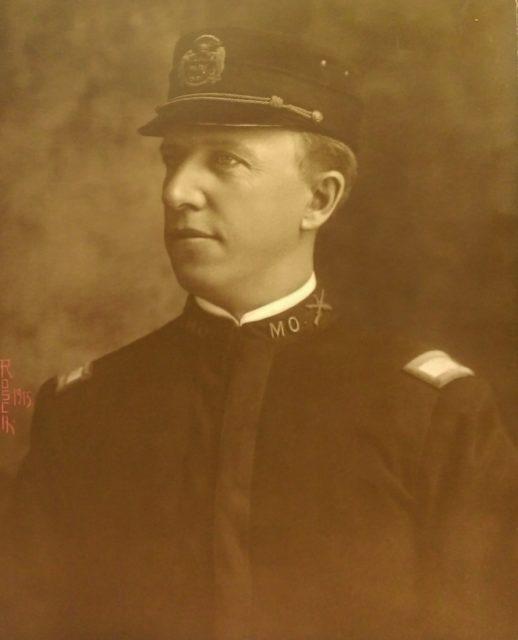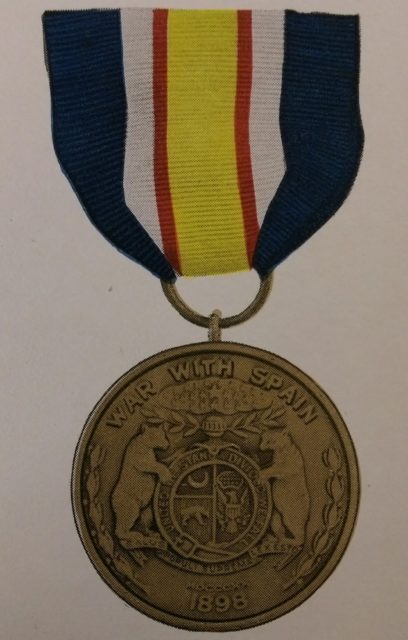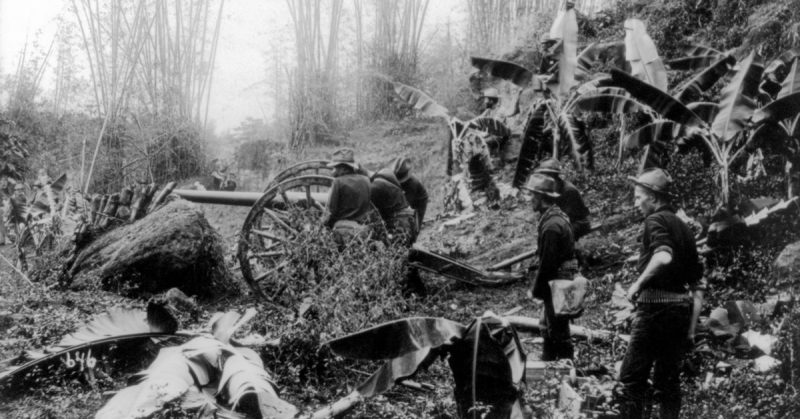War History online proudly presents this Guest Piece from Jeremy P. Ämick, who is a military historian and author of the upcoming Arcadia Publishing release “Missouri at War.”
The Missouri National Guard has struggled with its unique politics due to a blending of both state and federal authorities. The organization has labored to maintain its distinction as the state militia, which has led to some curious situations. It is evident in a conflict between a former state governor and the late Colonel Edwin Batdorf during the Spanish-American War.
Born near Dayton, Ohio, on October 4, 1853, Batdorf moved to Kansas in 1871, where his father operated a hotel. Years later, the July 28, 1898 edition of the Newton Daily Republican (Newton, Kan.) reported, the young Batdorf moved to St. Louis to clerk in a hotel and “afterward engaged in the commission business …”
In addition to working full-time, Batdorf became a private with the First Regiment—a former Missouri National Guard regiment located in St. Louis—and quickly rose through the ranks to become an officer. The budding officer soon discovered, however, that military organizations were subject to funding uncertainties originating from the state capitol in Jefferson City.
“On May 23, 1887, the First Regiment was disbanded owing to the fact that the State Legislature failed to provide for its support,” notes the 1934 book “History of the Missouri National Guard.” The book adds, “In the late summer of 1887, through the efforts of Lieutenant Edwin Batdorf, a battalion was organized, which was later expanded into a regiment and became the First Regiment, National Guard of Missouri.”
After becoming colonel on June 21, 1893, Batdorf did not enjoy a peaceful tenure in uniform and his reputation was scarred by altercations with the state leadership over his vocalized concerns, the most notable relating to the formation of the Missouri National Guard Association.

During the meeting that formed the association in January 1897, Adjutant General of the Missouri National Guard, Brigadier General Joseph Wickham, became the organization’s chairman. As noted in the January 3, 1897 edition of the St. Louis Post-Dispatch, it was proposed that the colonels of the state’s (then) four regiments and the captains of the two artillery batteries serve as vice-presidents.
Col. Batdorf “at once took violent objection to it on the grounds that Battery A, which had only seventy members, was awarded as great a representation as the First Regiment, with its membership of 700,” the newspaper explained. Following this incident, Batdorf and many officers of the First Regiment chose to boycott the newly formed association.
The expression of Batdorf’s concerns certainly did not endear him to state authorities but the arrival of a major mobilization of troops the following year would provide him yet another opportunity to distance himself from any favor with both the adjutant general and governor.
As noted in the 1939 edition of the “National Guard Historical Annual, State of Missouri,” during the Spanish-American War, Missouri was given the allotment of 5,000 volunteers as part of the president’s call for 125,000 volunteers on April 22, 1898, one day following Congress’ resolution of war with Spain.
The First Regiment became one of six Missouri regiments and a light battery of artillery mobilized during the conflict. Col. Batdorf and the men of the First mustered into federal service at Jefferson Barracks on May 13, 1898 and then left their St. Louis assembly site on May 19, 1898, bound for Camp George H. Thomas at Chickamauga Park, Georgia.
Despite the rather lackluster circumstances the regiment experienced while at camp in Georgia, any privations they were forced to endure were overshadowed in the newspapers by altercations between Batdorf and Missouri Governor Lon Stephens.
Appointed as an acting brigadier general during the greatest part of his Spanish-American War service, Batdorf and several officers of First Regiment quickly drew the ire of the Missouri’s governor when they refused to accept officer commissions issued from the governor.

Gov. Stephens received more unwanted news when Secretary of War Russell Alger submitted a ruling essentially nullifying the state commissions and affirming “the regiments were to remain as mustered in from the Stated Guards…,” as reported by the St. Louis Post-Dispatch on June 16, 1898.
Months later, the First Regiment returned to St. Louis, never having left the Unites States during the brief war. It was at this time Gov. Stephens gained somewhat of a victory over Batdorf when he reorganized the regiment and excluded Batdorf from the new command structure.
Batdorf again set the newspapers abuzz when he filed suit against the governor, seeking $50,000 in damages because of a “number of interviews with Gov. Stephens printed in various newspapers of St. Louis reflecting (unfavorably) upon Col. Batdorf as an officer and a gentleman,” wrote the St. Post-Dispatch on September 21, 1899.
The lawsuit was later dismissed and the colonel faded from public light until 1903, at which time Adjutant General W. T. Dameron, following the expiration of Gov. Stephens’ term, added Batdorf’s name to the honorary roll of retired officers of the Missouri National Guard.
In the years after his release from the National Guard, Batdorf’s life gained some semblance of normalcy as the married father of one son served as treasurer for the former Forest City Building Company in St. Louis.
The retired colonel received further recognition in 1920, seven years prior to his death, when Adjutant General Harvey Clark issued him a special medal authorized by the Missouri Legislative Assembly for the state’s veterans of the Spanish-American War.
Col. Batdorf passed away on January 14, 1927, when 73 years old, at Westgate Hotel in St. Louis and was laid to rest in his native state of Ohio. Though much of his embattled service with the National Guard has been forgotten, the words of another Missouri governor 20 years following Batdorf’s death stressed the importance of preserving the state’s military legacy, however controversial.
In a letter to the 49th Annual National Encampment of the United Spanish War Veterans in 1947, Gov. Phil Donnelly stated, “We revere the memory of the men who volunteered in Missouri Regiments in the Spanish-American War …,” adding, “(and) I am sure the pages of history will record your services, and the campaigns in which you engaged …”
